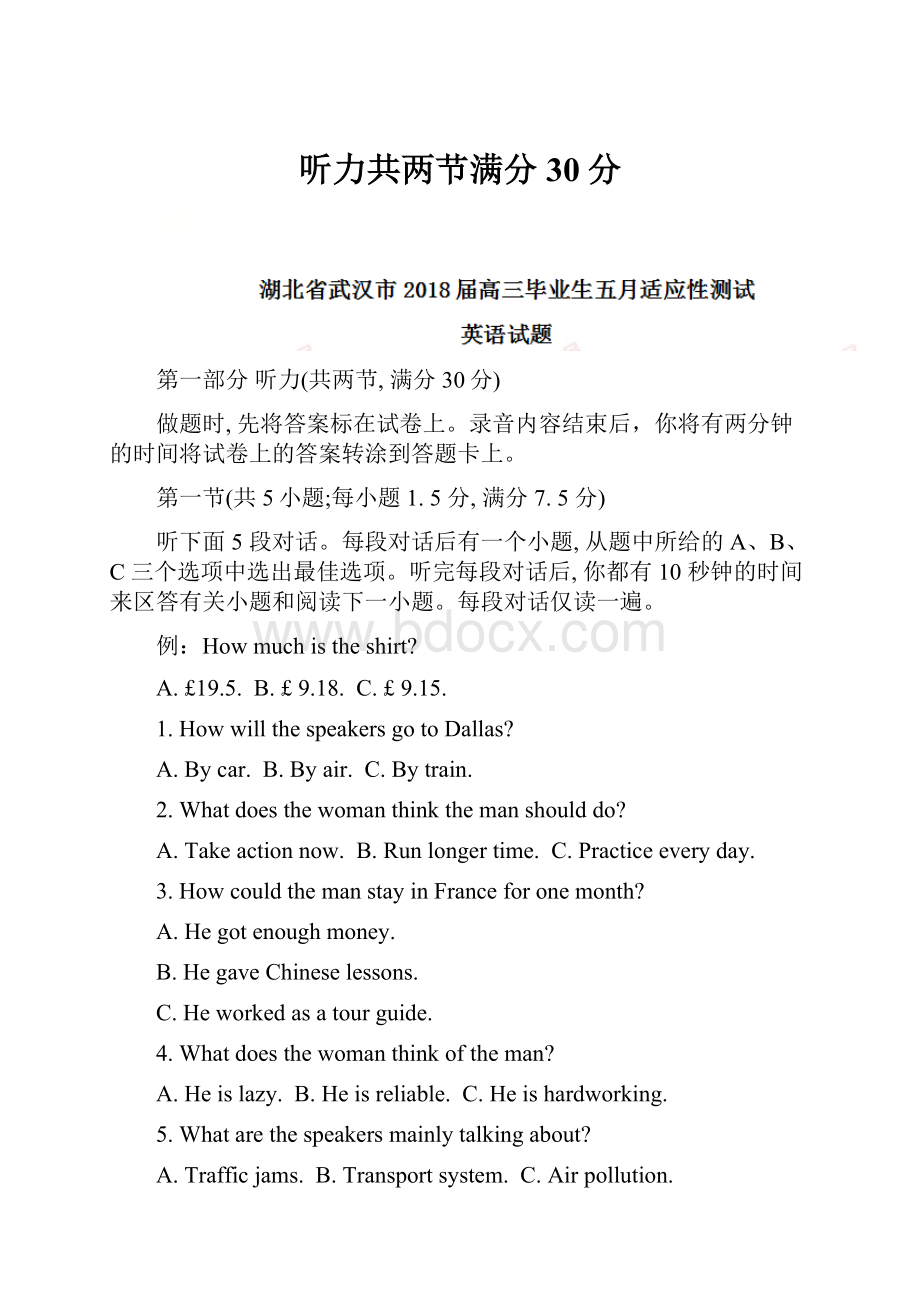听力共两节满分30分.docx
《听力共两节满分30分.docx》由会员分享,可在线阅读,更多相关《听力共两节满分30分.docx(15页珍藏版)》请在冰豆网上搜索。

听力共两节满分30分
第一部分听力(共两节,满分30分)
做题时,先将答案标在试卷上。
录音内容结束后,你将有两分钟的时间将试卷上的答案转涂到答题卡上。
第一节(共5小题;每小题1.5 分,满分7.5 分)
听下面5 段对话。
每段对话后有一个小题,从题中所给的A、B、C 三个选项中选出最佳选项。
听完每段对话后,你都有10 秒钟的时间来区答有关小题和阅读下一小题。
每段对话仅读一遍。
例:
Howmuchistheshirt?
A.£19.5.B.£9.18.C.£9.15.
1.How will the speakers go to Dallas?
A.By car.B.By air.C.By train.
2.What does the woman think the man should do?
A.Take action now.B.Run longer time.C.Practice every day.
3.How could the man stay in France for one month?
A.He got enough money.
B.He gave Chinese lessons.
C.He worked as a tour guide.
4.What does the woman think of the man?
A.He is lazy.B.He is reliable.C.He is hardworking.
5.What are the speakers mainly talking about?
A.Traffic jams.B.Transport system.C.Air pollution.
第二节(共15小题;每小题1.5 分,满分22.5 分)
听下面5 段对话或独白。
每段对话或独白后有几个小题,从题中所给的A、B、C三个选项中选出最佳选项。
听每段对话或独白前,你将有时间阅读各个小题,每小题5 秒钟;听完后,各小题将给出5 秒钟的作答时间。
每段对话或独白读两遍。
听第6段材料,回答第6.7题。
6.Where are the two speakers?
A.At home.B.At a party.C.At a car park.
7.Who is the woman speaker going to talk to?
A.The car owner.B.The man speaker.C.The lady in white.
听第7 段材料,回答第8、9题。
8.Where does Ms.Sharma work?
A.In the Housing Office.
B.In the Admission Office.
C.In the General Information Office.
9.What does the man speaker want to know from Ms.Sharma?
A.Housing fees.B.Schooling fees.C.Registration fees.
听第8 段材料,回答第10 至12 题。
10.What is the girl asking about?
A.How to exercise.B.How to plan a trip.C.How to make money.
11.What is the father’s first suggestion?
A.Putting an advertisement.B.Buying a bike.C.Sending papers.
12.Why does the girl prefer the job of walking dogs?
A.She likes nature.B.She likes animals.C.She likes walking.
听第9段材料,回答第13至16题。
13.Who made the Italian chicken?
A.The man’s girlfriend.B.The man’s mother.C.The man speaker.
14.What might have made the chicken green?
A.A teaspoon of sauce (沙司).
B.A half cup of sauce.
C.A half cup of onions.
15.Why did the man make the chicken?
A.To please his girlfriend.
B.To prove himself foolish.
C.To satisfy his own interest.
16.What is the man worried about?
A.Losing money.B.Losing face.C.Lasing appetite.
听第10段材料,回答第17 至20题。
17.w hat happened to some of the swimming pigs?
A.They’re dead.B.They’re drunk.C.They’re injured.
18.Who is to blame for the damage to the pigs?
A.The tourists.B.The government.C.The shopowner.
19.How many swimming pigs wereliving near“Pig Beach”?
A.About 7.B.About 15.C.About 22.
20.What has been done to protect the animals?
A.Building a special zoo.
B.Keeping tourists away.
C.Lengthening the boundary lines.
第二部分阅读理解(共两节,满分40分)
第一节(共15小题;每小题2分,满分30分)
阅读下列短文,从每题所给的A、B、C和D四个选项中,选出最佳选项。
A
Sometimeswestartadaywiththepreviousdaystillinmind.Wethinkaboutthemistakeswemadeinthepreviousday,howthingswentwrong,andhowwefeltbadaboutit.Nowonderitbecomesdifficulttofocusonthecurrentday.
Herearesomestepsonhowtostartyournewdayfresh:
1.Taketimetoevaluateyourday
Attheendofaday,takesometimetothinkaboutit.Thepurposeofthisthinkingtimeisnottoregrethowbadyourdaywas,howthingswentwrong,orhowpeopletreatedyoubadly.Thiswon’tdoyouanygood.Instead,thepurposeofthisthinkingtimeistoextract(吸取)lessonswhichyoucanbringtothefollowingday.
2.Makeacommitmenttoapplythelessons
Afteryouextractthelessons,youshouldmakeacommitmenttoapplythem.Todoso,findsomeactionablethingsyoucandotoapplythelessons.Next,remindyourselftodothem.Youmaywritethemdownifyouwantto.
3.“Close”yourday
Afteryouhavespentthetimetothinkaboutthedayandextractthelessons,makeadecisionto“close”theday.Youaredonewithit;don’thinkaboutitanymore.
4.Bringonlythelessonstothenextdayandnothingelse
Afteryou“close”aday,youshouldnotbringanythingoutofittothenextdayexceptforthelessonsyouextract.Focusonapplyingthelessonstothepresent.Thiswayyouwillbeabletostartyourdayfreshwithouttheburdenofyesterday.
21.Whatwillhappenifwethinktoomuchaboutthepast?
A.Therewillbeadisaster.
B.Therewillbegoodresults.
C.Wewon’thaveapeacefulmind.
D.Wesurelywon’tfinishtoday’stask.
22.Whenshouldwedrawlessonsfromthepastmistakes?
A.Attheendofaday.
B.Whenwemakemistakes.
C.Atthebeginningofaday.
D.Whenweregretmakingthemistakes.
23.Whyshouldweextractlessonsfromthepastday?
A.Tosetthemdown.
B.Toconsiderthemagain.
C.Tomakeabetterdecision.
D.Toapplythemforfutureuse.
B
Foryears,mytimespentintheshowercouldhavegotmeamentioninGuinnessWorldRecordsastheshortesttimetakentobathe.Ihurriedupduringthisprocess.
Oneday,however,whileataparty,Iheardanartistfriendtellingeverybodythathisideacamewhilehewashavingashower.“Whataboutyou?
”heasked.“Don’tyougetyourcreativethoughtsfromthesameplace?
”
“I’minandoutinahurry,”Itoldhimproudly.“Ihavenotimetowaste!
”
“Whatapity,”hesaid.”That’stheplacewhereyouneedtoslowdown;plentyofgreatthoughtscomefromthere!
”Itrieditout.Isloweddownthewholeprocess,startedenjoyingthewarmwater,takingalittlelongertosoapmyselfandevenspendingmoretimejustenjoyingtheprocess,andrealizedhowmuchIhadmissedinhurryingupalltheseyears.
Awomantoldmehowmuchstressherfriendwassufferingfromandhowshesoughttoconvinceherthatsheneededtofindwaystorelax.Shegaveheravideotapeonstressmanagementandrelaxationtechniques,andencouragedhertowatchitrightaway.Fifteenminuteslater,herfriendhandedbackthetape.Itwasgood,shesaid.“butIdon’tneedit.”
“Butit’sa70-minutevideo,thewomanreplied.Youcouldn’thavewatchedthewholething.”
“Yes,did,herfriendsaid.Iputitinfast-forward!
”
Amajorsocialproblemofthe21stcenturyisHurrySickness.Wehurrythroughwork.Weswallowfastfood.Wecomplainthatwedon’thaveenoughtime.Weracethroughthedaysandweeksuntilonedaywelookbackinamazementandcomment,Mygod,howtheyearsflewby!
Thenwerealizetheheavypricewehavepaidfortravelingfast.
SymptomsofHurrySicknessincludestressandanxiety,badrelationships,loweredworkperformanceandevendisease.Somepeopledon’tsurviveit.What’sthecure?
Slowdown,forlifeissoshortandpreciousthatwemustliveitwell.
24.Whatwastheadvantageoftakingashowerintheeyesoftheartistfriend?
A.Timewassaved.
B.Nothingwasmissed.
C.Greatideasflewaway.
D.Creativethoughtscame.
25.Whatwasthetroublewiththewoman’sfriend?
A.Shefeltstressed.
B.Shefoundthetapeuseless.
C.Shefoundnowaytorelax.
D.Shewatchedthetapetoofast.
26.Whatisthemajortroublepeoplefaceinthe21stcenturyinthewriter’seyes?
A.Peoplerunfasttowork.
B.Everythingisdoneinahurry.
C.Peopledon’thaveenoughtime.
D.Timeflieswithoutbeingnoticed.
27.Howcantheproblembesettled?
A.Bypacingdown.
B.Bylearningtosurvive.
C.Bydevelopingfriendship.
D.Byperforminggoodwork.
C
Itcouldhavebeenanyofus,butithappenedtobeme.Ireceivedabrief18monthsofundividedattentionandloveastheonlychild,beforethreemoreappeared.Thesecondwasasevereblow.Nodoubt,learningtheneedtosharewasimportant,butIhadtastedthelifeofanonlychild.
Thencameyearsofrequeststolookafterthesiblings(兄弟姐妹),beingurgedthat,Youshouldbesettingabetterexample,AgainandagaintheothersgotawaywithdoingwrongbutIdidn’t.Weeachplayedourroles:
thesecondonewholaterskippedschooltomeetboys;theeversoattractivethird,theboywhocoulddonowrong;andfinallythesurpriseappearanceofthefourth,seemedcertaintobespoiledevennow.Sothatleftme:
thereasonable,quietonewhogotthegrades,didthehouseworkandbecameachameleon(变色龙)—skilledatreadingasituationandbeingwhatwasneeded.
Theneventuallycamethechancetobethefirsttoleaveandexperiencelifeontheoutside,notdefined(定义)astheeldest.ThemomentIhadwaitedfor.Butnow,manyyearslater,beingtheeldestmattersagain.I’sdowntome,itseems,totaketheleadincaringforourparents.AllthetimeIwasmadetolearnaboutsharing;however,whenitcomestoresponsibility,itnolongerseemstoapply.Theothersaretoobusy,toofaraway,ortoounconcerned.SodutifullyItravelmanytimesacrossthecountryforhourstoprovidecareandsupport.Requeststomysiblingstohelpoutmorefallondeafears.Tome,thedutifulfirstborn,itfeelsliketherightandonlythingtodo:
tobethereforourparentsastheywereforus.Sadly,thatfeelingisn’tsharedbythesecond,thirdorfourth.
28.Howdoestheauthorcommentonthefourchildreninthesecondparagraph?
A.AngrilyandBitterly.
B.Angrilyandproudly.
C.Bitterlyandhumorously.
D.Humorouslyandproudly.
29.Howdidtheauthordevelophissocialskills?
A.Throughhardwork.
B.Withtheparents’help.
C.Attheparents’request.
D.Inpracticeforeffectiveness.
30.Whatdoestheunderlinedword“it”inthelastparagraphreferto?
A.Tocarefortheold.
B.Tohelptheyoung.
C.Toliveoutsidealone.
D.Totravelnationwide.
31.Whatcanwelearnfromthetext?
A.Thewriterhatestobetheeldest.
B.Thewriterfeelsproudofhisrole.
C.Thewriterissatisfiedwithhisattempt.
D.Thewriterisregretfulaboutthesiblings.
D
TheMalteseIslandsarerichinNeolithic(新石器时代的)sites.GgantjainGozo,Tarxien,and